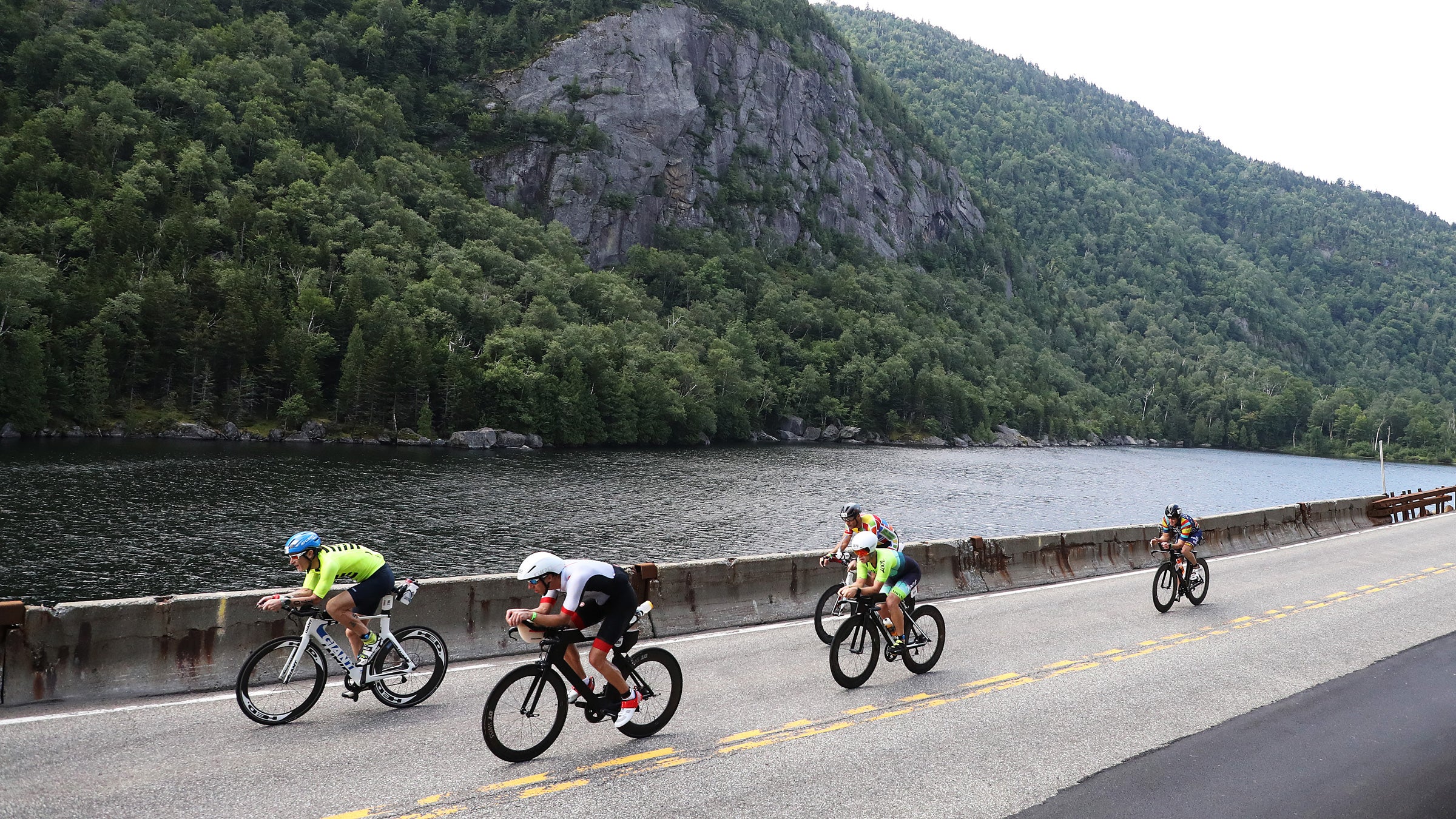Ironman Lake Placid to Require Proof of Vaccination

Athletes compete in the 2019 Ironman Lake Placid triathlon. (Photo: Al Bello/Getty Images)
Town officials approved the popular Ironman Lake Placid to move forward this summer, scheduled for July 25, with a number of COVID modifications. Most notably, athletes, volunteers, and staff will be required to get vaccinated and show proof of their COVID-19 vaccine.
No Ironman race has yet required vaccination, but as the Lake Placid village board noted in their May 17 meeting, “this could become the model for future events.”
The village board approved the plan submitted by Ironman after what the town clerk said extensive discussions over the previous two weeks as they fine-tuned the requirements of permit approval. The main stipulations of the town, county, and region were: the vaccination requirement and a 20% reduction in capacity. The town of North Elba also, reportedly, approved the plans this week.
You can see the plan Ironman submitted for approval here.
Ironman’s plans submitted to the Lake Placid board stated that they will require proof of vaccination for athletes, staff, volunteers, officials, vendors, and spectators in certain designated areas. Those who have provided proof of vaccination will then be given a different colored wristband. New York state also has the Excelsior Pass program, which provides a digital proof of vaccination and which can be used to provide proof to race organizers for these purposes.
“These are new requirements set forth by the village of Lake Placid, the town of North Elba and the regional office of sustainable tourism with regards to hosting events this summer in the community,” said Ironman officials.
A number of athletes in Lake Placid Facebook training groups and in online forums expressed concern that this requirement violates their medical privacy and/or their civil rights.
That’s simply not the case, said Kelly Burns Gallagher, a triathlete, coach, and employment labor specialist, who has looked extensively into the law around vaccine requirements for companies. “You don’t have a right to do an Ironman,” she said.
More specifically, discrimination statutes don’t apply here, she said, because Ironman is a private entity and because discrimination must be against a protected class of people. Even if a case was brought against Ironman, she said, there is plenty of case law allowing vaccines to be required with two exceptions: certified and document medical exemptions, and “sincerely held religious beliefs.”
But even those don’t apply to a privately run race. Ironman is allowed to place whatever rules it wants on its competitors, she said—like requiring them to qualify for the event or to finish in a certain time or to attend specific packet pick-ups. “It’s really no different than Ironman saying you have to make a swim cutoff,” she said.
Though they can legally require vaccinations, Ironman may still have some logistical issues. The race is popular with Canadian athletes, who have not had the same access to vaccines as most Americans, especially those in the New York region. Canada’s vaccination rate is currently at just 3.3%—ie. those who are fully vaccinated.
It is, in part, because of these concerns that Ironman is giving registered athletes, many of whom deferred from last year’s canceled event, options. Athletes received an email giving them the choice to transfer to Ironman Chattanooga or Ironman Maryland as long as spots remain open or to defer to next year’s Ironman Lake Placid up until race day.
No other race has yet required vaccines, though the New York Marathon yesterday announced it would move forward with a 40% smaller event this fall and would require athletes have either a negative COVID test or proof of vaccination. To date, all Ironman races in the U.S. since the start of the COVID pandemic have happened in Texas, Florida, Arizona, and Utah—with Ironman Tulsa scheduled for this weekend. As events expand into other parts of the country—notably events on the Big Island—there may be more local requirements, like vaccination, stipulated as part of the permitting process.
The Lake Placid village board, in their meeting, went on to note that many in the community are still concerned about their safety and about the influx of people. The town hosted a bubble for women’s professional hockey earlier this year, with COVID protocols in place, and still experienced an outbreak that required the hockey league to be suspended. However, with the vaccination requirement, and the reduction of athlete numbers, and canceling of things like the welcome dinner, and spacing and athlete flow stipulations in the operational plan, the board felt much better about the safety of the locals and felt good approving the Ironman race.
But, if case numbers go up, the town clerk noted, or things change, then “we have the ability to stop the race.”